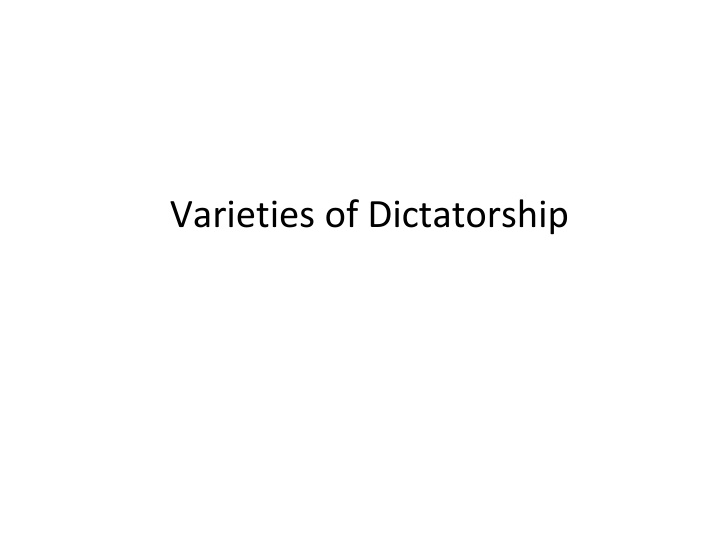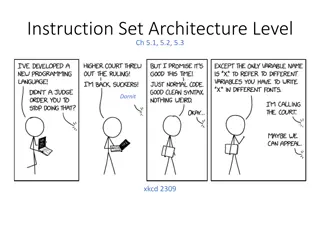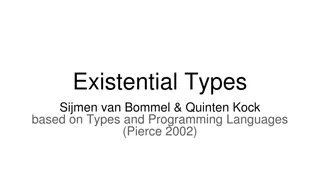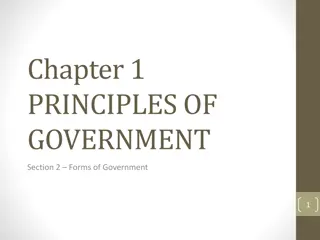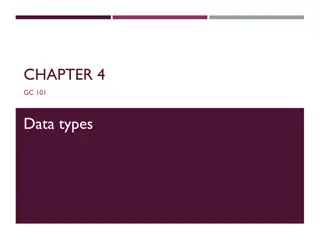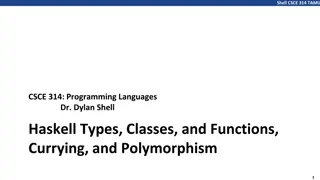Types of Dictatorships: A Comprehensive Overview
Explore the various classifications and typologies of dictatorships, including monarchic, military, and civilian regimes. Learn how dictators maintain power through support coalitions and understand the differences between these autocratic forms of governance. Delve into examples of monarchic dictatorships like Jordan and Saudi Arabia, and discover the challenges and characteristics of different types of authoritarian leadership.
Download Presentation

Please find below an Image/Link to download the presentation.
The content on the website is provided AS IS for your information and personal use only. It may not be sold, licensed, or shared on other websites without obtaining consent from the author.If you encounter any issues during the download, it is possible that the publisher has removed the file from their server.
You are allowed to download the files provided on this website for personal or commercial use, subject to the condition that they are used lawfully. All files are the property of their respective owners.
The content on the website is provided AS IS for your information and personal use only. It may not be sold, licensed, or shared on other websites without obtaining consent from the author.
E N D
Presentation Transcript
There are many different types of dictatorship. One common typology classifies dictatorships based on the characteristics of their inner sanctums or support coalitions.
1. A monarchic dictatorship is an autocracy in which the executive comes to and maintains power on the basis of family and kin networks. 2. A military dictatorship is an autocracy in which the executive relies on the armed forces to come to and stay in power. 3. All other autocracies are civilian dictatorships.
Classifying Dictatorships 1. Who is the effective head of government? 2. Does the effective head of government bear the title of king and have a hereditary successor or predecessor? Yes No 3. Is the effective head of government a current or past member of the armed forces? MONARCHY Yes No MILITARY CIVILIAN
Monarchic, Military, and Civilian Dictatorships, 1950-2022 60 50 40 Number of Dictatorships 30 20 10 Civilian Military Monarchy 0 1950 1960 1970 1980 1990 2000 2010 2020 Year
Dictators need to keep their support coalitions happy to stay in power. Dictators tend to be replaced by defecting members of their support coalition. The persistence of an authoritarian leader s type when the particular authoritarian leader is removed is why we often talk of dictatorial regimes rather than just dictatorial leaders.
Less violence and political instability than other forms of dictatorship. Monarchic leaders survive in office longer than other authoritarian leaders. More stable property rights and faster economic growth than other types of dictatorships.
Monarchies have developed a political culture where a leaders promise to distribute rents is particularly credible. Clear rules on who is an insider and who is an outsider. Rules and norms on how rents are to be shared among members of the royal family. Institutions to monitor the actions of the ruler and enforce norms regarding the distribution of rents.
Examples: Thailand, Myanmar, Chad, Burkina Faso, Gabon, Guinea, Sudan.
The most pressing threat to the stability of military dictatorships tends to come from within the military itself.
Total Number of Failed and Successful Military Coups, 1945-2022
A decline in the number of military coups since the 1960s 40 Successful Failed 35 30 Number of Military Coups 25 20 15 10 5 0 1945-1949 1950-1954 1955-1959 1960-1964 1965-1969 1970-1974 1975-1979 1980-1984 1985-1989 1990-1994 1995-1999 2000-2004 2005-2009 2010-2014 2015-2019 2020-2022
Military dictatorships tend to have short durations and are more likely to end with negotiations as opposed to violence than other types of authoritarian regime. More likely to leave behind competitive and democratic forms of government than other types of dictatorship.
The value associated with giving up power is considerably higher for military dictatorships than for other forms of dictatorship. Because the military has all the guns, it retains a credible threat to re-intervene in politics. The military can give up power safe in the knowledge that whoever wins the elections will still have to take account of its preferences. In many cases, the military will negotiate the handover of power to make sure that its interests are protected.
Timing of Elections after Military Coups 1991-2004 1960-1990 25% 26% 74% 75% Election held less than 5 years after a military coup No elections within 5 years of a military coup
Examples: Belarus, China, Egypt, North Korea, Russia, Syria, Turkmenistan.
Unlike monarchic and military dictatorships, civilian dictatorships don t have an immediate institutional base of support; instead they have to create one. Many civilian dictators do this with the help of regime parties or personality cults.
Two subcategories of civilian dictatorships: 1. A dominant-party dictatorship is one in which a singe party dominates access to political office and control over policy, though other parties may exist and compete in elections. 2. A personalistic dictatorship is one in which the leader, although often supported by a party or military, retains personal control of policy decisions and the selection of regime personnel.
Dominant-Party Dictatorships After authoritarian monarchies, they are the longest-lived dictatorships. Majority factions within regime parties try to co-opt minority factions rather than exclude them from power. Regime parties often engage in electoral fraud to deter regime party defections and discourage opponents. Economic downturns can create problems with stability for dominant-party regimes because they reduce the resources available for buying off potential rivals.
Personalistic Dictatorships A weak or nonexistent press, a strong secret police, and an arbitrary use of state violence that keeps the population living in fear. Elaborate personality cults.
A cult of personality consists of a set of beliefs, values, myths, symbols, and rituals directed at the adulation of the leader. Personality Cult of Kim Jong-il in North Korea North Korea, Part I, click here (9:49) North Korea, Part II, click here (6:50) North Korea, click here (1:36)
What role do personality cults play in keeping civilian dictators in power? Creations of narcissistic and power-hungry leaders who wish to be flattered and deified. They create loyal citizenry true believers by producing false beliefs in the population through state indoctrination.
But personality cults and the propaganda claims made by authoritarian rulers are often ridiculously unbelievable. It s hard to believe that large numbers of people are actually persuaded by the outlandish claims made by some authoritarian rulers.
But personality cults and the propaganda claims made by authoritarian rulers are often ridiculously unbelievable. It s hard to believe that large numbers of people are actually persuaded by the outlandish claims made by some authoritarian rulers. If personality cults aren t really about persuasion, what are they about?
One story is that personality cults are strategies of domination. The use of cult imagery and discourse is designed to habituate citizens into behaving as if they believe the official rhetoric by enforcing rules on acceptable speech and behavior. They intimidate the masses by showing what the regime is capable of making the people say and do.
Another story is that they act as a screening device for loyalty and other desirable characteristics of supporters and subordinates. Rulers have to delegate tasks such as repression or policy implementation to subordinates or agents to act on their behalf.
Adverse selection problem: How can you make sure that you delegate to the right type of agent? The dictator s dilemma is that he relies on repression to stay in power, but this repression creates incentives for everyone to falsify their preferences so that the dictator never knows his true level of societal support.
Personality cults can help with adverse selection problems by allowing you to screen out less loyal agents. Elaborate personality cults can arise when people try to outdo each other when trying to signal their loyalty to the ruler. By repeating outlandish claims, supporters of the leader enhance the credibility of their loyalty signal by tainting their reputation with opposition groups, thereby reducing their exit options. The psychological costs of preference falsification may be lower for more loyal and unscrupulous individuals.
Personality cults are a rational tool for helping dictators stay in power and achieve their goals. This story can help to explain why some leaders in democracies also make outlandish and demonstrably false claims and why some people publicly repeat or accept them.
Personalist Dictatorships The leader s faction frequently keeps tight control over the spoils of office. More likely to end in violence than other types of dictatorship. Become unstable only when there s an economic catastrophe, when the security apparatus and military defect, or when the leader dies and the system of patronage based around him collapses.
The Two Fundamental Problems of Authoritarian Rule
There are two fundamental problems of authoritarian rule: 1. The problem of authoritarian power-sharing 2. The problem of authoritarian control
The problem of authoritarian power-sharing focuses on intra-elite conflict.
When a dictator first comes to power, there is a power-sharing agreement on how to share rents among the members of his support coalition.
Regime type democracy and dictatorship is a foundational political institution. In contrast to contracts between private actors that can be enforced by a third party (the state), there s no higher independent authority with the power to force a democratic or dictatorial state to comply with the rules of the game. Dictatorial (and democratic) rulers abide by the rules of the game only if it s in their interests to do so.
Power-sharing agreements in these situations must be self-enforcing. Without third-party enforcers, the threat of violence plays a prominent role in the resolution of political conflict. Power-sharing agreements reflect the underlying balance of power between different sets of political actors. If the balance of power changes, so does the power-sharing agreement and with it the nature of the regime.
When a dictator first comes to power, there is a power-sharing agreement on how to share rents among the members of his support coalition. But the dictator always has an incentive to alter the power-sharing agreement to his benefit.
The only thing stopping the dictator from grabbing more power is the ability of the support coalition to replace him via a coup. When the threat to remove the dictator is credible, we have a contested dictatorship where power is shared between the dictator and his allies. When the threat to remove the dictator isn t credible, we have a personalist dictatorship where power lies only in the hands of the dictator.
The support coalition has limited information about whether the dictator is actually violating the power-sharing agreement. Coups are costly. The uncertainty about the dictator s actions and the reluctance of the support coalition to rebel creates incentives for the dictator to try to gain more power.
In this account, personalist dictatorships arise when the support coalition repeatedly fails to act in response to a series of power grabs by the dictator.
When the support coalition cant fully monitor the dictators actions and can t be confident the dictator is following the agreement rather than trying to surreptitiously consolidate power, they might either launch an unnecessary coup or, through inaction, find that they have been marginalized (or worse).
Political institutions can help solve the asymmetric information or monitoring problem at the heart of intra-regime conflict. Legislatures and parties can provide a forum for exchanging information and deliberating about policy. Having formal rules and protocols makes it easier to see when they ve been violated.
Weve seen that dictatorships adopt institutions such as legislatures and political parties to reward their allies in the support coalition and to co-opt members of the opposition. But they also adopt them to help solve informational problems within the authoritarian elite.
Information on its own, though, isnt sufficient to create a stable power-sharing arrangement. The support coalition still needs the ability to credibly punish the dictator if he reneges on the agreement.
